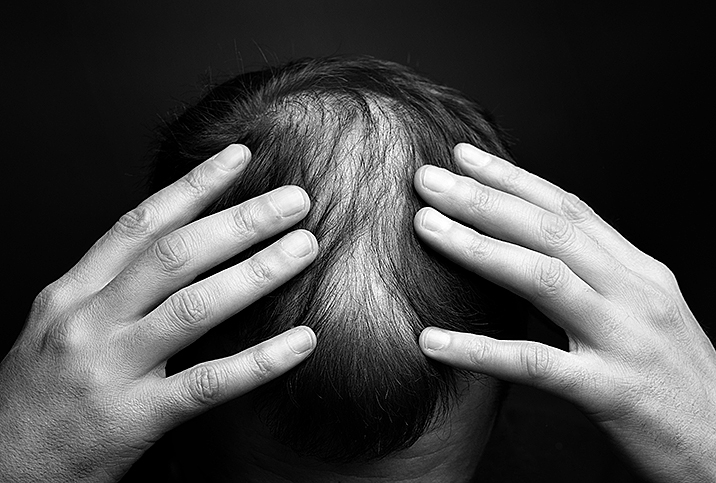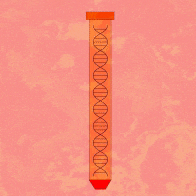Hair-Loss Treatment May Skew Your PSA Test Results

Male hair loss is a pretty common problem. (Did you just touch your head?) By age 35, two-thirds of American men will experience some degree of hair loss, according to the American Hair Loss Association. By age 50, up to 85 percent of men will have significantly thinning hair. For more than 95 percent of men, androgenetic alopecia, or common male pattern baldness, is the leading cause of this problem.
Thankfully, drugs such as minoxidil (Rogaine) and finasteride (Propecia) are available to help mitigate the dwindling follicles. But did you know finasteride can affect prostate cancer screening tests? That's an important detail to know if you are taking drugs for hair loss.
What is finasteride?
Dihydrotestosterone (DHT) is an androgen, a sex hormone involved in the development of male sex characteristics. However, high levels of DHT can also shrink the hair follicle and lead to baldness.
Finasteride, which is approved by the Food and Drug Administration (FDA), is a first-line drug for male pattern baldness that effectively lowers DHT levels in the scalp by as much as 60 percent when taken daily. It belongs in the 5-alpha reductase inhibitor family, according to Ramy Abou Ghayda, M.D., MPH, who practices and teaches urology at University Hospitals in Ashland, Ohio. He added finasteride can also be used to treat benign prostatic hyperplasia (BPH) by reducing DHT levels in the prostate.
"Finasteride is used in doses of 5 milligrams to treat benign prostatic hyperplasia and 1 milligram daily to treat male pattern baldness," said Erum N. Ilyas, M.D., MBE, FAAD, who practices at Schweiger Dermatology Group in King of Prussia, Pennsylvania.
Clinical trials indicate 86 percent of men who take finasteride find it effectively stops hair-loss progression. However, like all drugs, there are potential side effects, one of which is altering prostate screening test results.
What to know about finasteride and PSA
Prostate-specific antigen (PSA) is a protein produced by both normal and cancerous cells in the prostate gland. Clinicians perform a blood test that measures PSA levels to screen for prostate cancer. Elevated PSA levels may concern doctors, though several factors besides cancer can lead to such a result.
Finasteride can potentially skew a PSA test result, according to Mark Leondires, M.D.
"This actually happens quite frequently," said Leondires, the founder, medical director and partner in reproductive endocrinology at Reproductive Medicine Associates of Connecticut. "There is often a 50 percent reduction in the PSA level when finasteride is used. This can lead to incorrect PSA test results, which can then increase the chance of missing important prostate cancer markers. All male patients should always have their PSA checked prior to starting finasteride to establish a baseline PSA level."
Ilyas delved into the research on finasteride and prostate cancer a bit further, pointing to a large study from 2006 that showed men taking finasteride had a lower risk of developing prostate cancer overall. The counterpoint was that when they did develop prostate cancer, it tended to be a higher grade, possibly owing to PSA test results lowered by up to 50 percent because of finasteride.
"There was a study in 2019 that demonstrated that the use of finasteride may delay prostate biopsies, show worse pathology and increase the mortality associated with prostate cancer," Ilyas said.
Is it safe to take finasteride?
"From a PSA perspective, finasteride is considered overall safe and effective to treat and manage male pattern baldness with the appropriate monitoring in place," Ilyas said. "As long as the patient and their primary care physician understand that the PSA level needs to be adjusted and that prostate cancer screenings should include digital rectal examinations, as well, these potential challenges can be managed."
'All male patients should always have their PSA checked prior to starting finasteride to establish a baseline PSA level.'
She stressed how important it is for doctors to recognize trends that indicate a patient's PSA level is increasing over time—which depends on patients disclosing their finasteride use to their doctor. If results are increasing, even if they're still in the "normal" range, the patient should be referred for further evaluation, because PSA levels may need to be doubled to reflect "an accurate interpretation in the setting of taking finasteride," Ilyas added.
"All doctors should be aware that their patient's PSA results will be affected by finasteride," Leondires said. "They should personalize these results depending on the dose and duration of finasteride usage."
Other side effects to consider
Ilyas advises her patients that finasteride's side effects come in a couple of different flavors: reversible and potentially irreversible.
"Libido disorders, ejaculation disorders and orgasm disorders are potential adverse effects that may be reversible after discontinuation of the medication," she said. "However, there is the potential for these to be irreversible side effects and persist even after discontinuation of the medication. The potentially irreversible nature of these side effects led the FDA to revise the label in 2012 to reflect this."
She also pointed to reports of male infertility and/or poor semen quality, side effects that are thought to normalize or improve after stopping the medication.
Other reported side effects include:
- Breast tenderness and enlargement
- Depression and anxiety
- Allergic reactions, runny nose and skin rashes
- Testicular pain
- Neurological problems
- Headaches, dizziness and weakness
It's best to talk to your doctor if you have any concerns about the potential side effects of finasteride.
Know this if you want to take finasteride for hair loss
After discussing the pros and cons of finasteride with your doctor, you may decide it is the right hair-loss medication for you. If this is the case, Ghayda advised the following workarounds to ensure you take finasteride safely:
- "Do not take finasteride unless you have a medical reason to."
- "Always allow a medical healthcare professional to prescribe the medication."
- "Ensure frequent follow-up and reassessment of the need to take finasteride."
- "Always remember and remind your doctor to adjust for PSA levels in the serum."
- "Before starting the medication, have a prolonged discussion with your healthcare providers regarding the risk and benefits of finasteride therapy."
- "Look out for potential side effects or adverse events and report them to your physician early, so that the medication can be discontinued if necessary."
As Leondires pointed out, it's important to get your PSA level checked before you start taking finasteride. Finasteride is safe, he reiterated, but he mentioned minoxidil as a good alternative.
Alternative hair-loss treatments
"Hair loss can be caused by many risk factors, including genetics, hormones, environmental exposure, medications and nutrition. Thus, hair loss requires a multimodal approach," Ghayda explained. "Minoxidil 2 percent or 5 percent solution is often used for hair loss. This medication has not been compared head to head with finasteride in a robust scientific study. It is usually well-tolerated but also has a list of side effects that patients should be aware of."
Ghayda pointed to many other products and medications that have been used for hair loss—vitamins, trace minerals, hormones, antioxidants, acupuncture, massage, low laser light therapy hats—but emphasized that most of those treatments lack solid data and any evidence-based study for their effectiveness.
Ilyas also discussed available hair-loss treatments such as platelet-rich plasma (PRP) injections and hair transplants.
"A detailed discussion of each to determine where each patient is in terms of expectations and desired outcomes helps guide patients to make the best decision for them," she said.




















